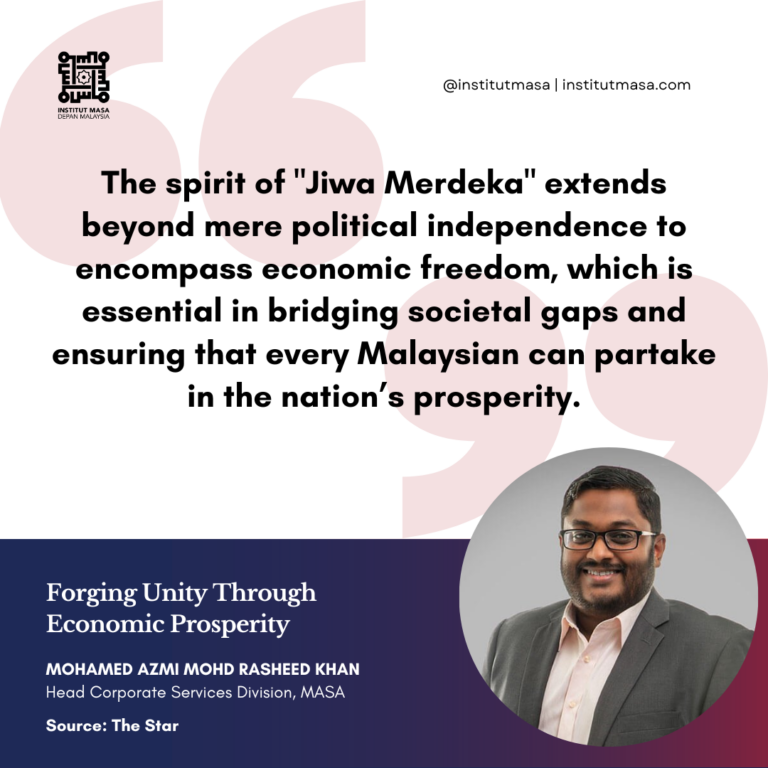By Mohamed Azmi Mohd Rasheed Khan
As Malaysia celebrates its 67th Independence Day this Saturday (August 31), the nation finds itself at a pivotal moment, reflecting on its journey towards unity, progress and sustainability. This year’s theme, “Malaysia Madani: Jiwa Merdeka” (Spirit of Independence), encapsulates the essence of a nation striving for holistic development that encompasses social, cultural and economic dimensions.
Since gaining independence in 1957, Malaysia has embraced its multicultural identity, with the Malays, Chinese, Indians and various other groups, weaving a rich tapestry of culture and tradition. National unity has been the cornerstone of Malaysia’s development, supported by various policies and initiatives, aimed at fostering integration and mutual respect among the diverse ethnic communities.
However, as the country matures, it becomes evident that unity transcends social constructs and emerges as an economic imperative. The concepts of the Shared Prosperity Vision 2030 (SPV2030) and the present initiative by the present government underscore the need for an integrated approach to national development, where economic, social and cultural dimensions are interlinked.
The spirit of “Jiwa Merdeka” extends beyond mere political independence to encompass economic freedom, which is essential in bridging societal gaps and ensuring that every Malaysian can partake in the nation’s prosperity.
Malaysia’s pursuit of economic unity has seen several milestones, notably the introduction of the New Economic Policy (NEP) in 1971 which was aimed at eradicating poverty and restructuring society to dissociate race from economic function. While the NEP made strides in addressing economic disparities, it also revealed the persistent inequalities that challenge the nation today.
As Malaysia continues to evolve, the focus must shift towards developing policies that address contemporary needs without alienating any community. Despite notable economic progress, challenges such as income inequality, regional disparities and limited access to quality education and employment opportunities, remain. The Covid-19 pandemic has further exacerbated these issues, disproportionately affected vulnerable populations and increased poverty rates.
To tackle these challenges, there is a need to adopt a more inclusive economic framework that emphasises on sustainable growth and equitable wealth distribution. Key strategies should include strengthening education and skills development to ensure access to quality education and vocational training, particularly in underserved areas, to equip all Malaysians with the skills needed to thrive in the workforce.
In enhancing social safety nets, unemployment benefits, healthcare and housing assistance should be expanded to help reduce poverty and provide essential support to vulnerable groups. The promotion of inclusive economic growth will foster policies that prioritise job creation, entrepreneurship and small business development for fair and equal economic growths for all Malaysians.
In encouraging regional development, the authorities must be able to address regional disparities through investments in infrastructure, education and healthcare which are crucial for promoting economic unity across the nation.
The implementation of a progressive taxation could help reduce income inequality and ensure that wealth is distributed more equitably to fund social programs for the benefit all citizens.
The National Unity Index (IPNas) serves as a vital tool in assessing the social health of the nation under the SPV2030 where it measures factors such as social integration, tolerance, trust and mutual respect among Malaysia’s diverse ethnic groups. In 2022, Malaysia’s level of unity was assessed as “moderate,” with an IPNas score of 0.629, reflecting an improvement from 0.567 in 2018.
The index categorises scores into four levels – poor unity (0.0-0.24), low unity (0.25-0.49), moderate unity (0.50-0.74) and high unity (0.75-1.0). Key indicators influencing the index include ethnicity, inter-ethnic relations, racial ethos and governance and development. The government aims to enhance this score to 0.7 by 2025, aligning with efforts seen in other nations striving for improved social cohesion.
This progress indicates a growing sense of shared national identity, yet challenges persist, particularly regarding economic disparities. The index highlights that regions with lower economic opportunities often exhibit weaker social cohesion, emphasising the need for policies that promote inclusive growth and equitable distribution of resources.
As Malaysia commemorates its Independence Day, it is essential to reflect on the importance of economic unity in building a resilient and harmonious nation. By addressing economic disparities and promoting inclusive growth, Malaysia can ensure that all citizens have the opportunity to thrive and contribute towards the nation’s success.
The journey towards better unity is fraught with challenges, but with the right policies and initiatives, Malaysia can continue to build on its legacy of unity.
True independence encompasses not only political freedom but also the assurance that every Malaysian has the opportunity to achieve economic prosperity and contribute to the nation’s progress.
As the country moves forward, it must remember that unity, in all its forms, is the foundation upon which its future will be built.
May this day serve as a reminder that true independence is not merely the absence of colonial rule but the presence of economic equity, social cohesion and mutual respect among all communities.
Let us strive together to build a Malaysia where unity is not just a dream but a lived reality, and where every citizen has the opportunity to thrive in a harmonious and inclusive society. May the spirit of “Jiwa Merdeka” inspire us to work collectively towards a brighter, more prosperous future for all.
Source: https://www.thestar.com.my/opinion/letters/2024/08/28/forging-unity-through-economic-prosperity




